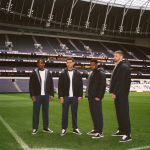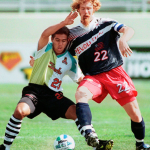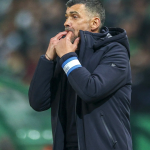
Can players no longer celebrate?
The caution to Lukaku is just the latest example of how Italian football does not know how to deal with racism
April 5th, 2023
Lukaku scored the equalising penalty in the last available minute of the Coppa Italia semi-final first leg at Juventus Stadium, cheering under the curve where the Bianconeri goal was in the second half. He cheers as he did a few days ago in the national team after his hat-trick in Sweden, with what the newspapers hastily called a 'polemical gesture'. He will do the same after the Red Devils' second goal in Germany, bringing his right index finger to his lips and his left hand to his temple to make a kind of military salute. In reality, the cheer is dedicated to his national teammate Doku, who had to miss the game due to injury, but in the Inter striker's complicated year, that finger, that look and that stance also mean something else. At least according to the reading of referee Massa, who decided to draw the second yellow against Lukaku - who had previously been reprieved for a foul on Gatti - and consequently rule him out and disqualify him before the second leg.
This is not the first time a player has been cautioned for cheering, indeed it is becoming an unpleasant repeat with some similarities. On 9 January 2022, in the Serie A match Udinese-Atalanta that ended in a 2-2 draw, Ademola Lookman was penalised by referee Doveri for cheering in the same way he has been doing since 2015, namely imitating binoculars with his hands in front of his eyes. Despite the controversy caused by this decision, this yellow card was never withdrawn - as Simone Inzaghi falsely claimed yesterday - and the Atalanta striker was even advised by his father to change his cheer. Four years earlier, by contrast, it was Kean who was cautioned after responding to racist chants from the Cagliari crowd during Juventus' match in Sardinia. At the time, it was even Bonucci - an expert in provocative cheering - who played it down, saying the blame should be shared equally between his teammate and the opposing fans. In October 2021, however, it was Ibrahimovic who received a card for reacting to the racist insults of Roma fans after the winning goal.
After sanctioning different types of cheering, e.g. when a player takes off his jersey, the main problem now seems to be provocative behaviour towards opposing fans. The official regulations, updated as of 1 July 2022, state in Article 12 that: "A player shall be cautioned, even if the goal is disallowed, if he: approaches spectators in a manner that causes safety problems and/or climbs over the fence, behaves in a provocative or taunting manner, covers his head or face with a mask or similar object, removes his shirt or covers his head with his shirt". However, the problem here remains, as always, the discretion of the referee who may or may not consider a cheer to be within the rules and the extent to which such gestures are reactions to a context of insults and racist chants.
Immediately after last night's triple final whistle, video footage was released from the Juventus side that well illustrates the extent of the aggression Lukaku endured. Roc Nation, the agency representing the Inter striker, commented through Head of department Michael Yormark words: "The racist abuse from Juventus fans towards Romelu Lukaku is beyond despicable and cannot be tolerated. Romelu converted a penalty in the last moment of the match and was subjected to hostile and disgusting racist chants before, during and after the penalty [...] The Italian authorities must take this opportunity to stop racism instead of punishing the victim of the abuse." But the reversal of the role of the victim, who is always dragged into the dock, is unfortunately a habit of the football apparatus in Italy, as is the usual underestimation of the problem of racism, which indiscriminately affects all Serie A stadiums.
Indeed, the monkeys created by artist Simone Fugazzotto or the other initiatives launched so far to raise awareness of all forms of discrimination and racism have hardly been used; the phenomenon remains a dramatic issue at every match, whether the match officials accept it or not. And equating those who insult players because of the colour of their skin with those who try to rebel against the constant verbal assaults remains the most cowardly and insidious part of the affair. Both Kean and Lookman, and eventually Lukaku, are indeed black footballers, and their stories show how differently they are judged not only by opposing corners, but also by a rulebook that is all too open to interpretation by those who prove they do not have the right tools to do so. Until the Lega Serie A itself understands the difference between a normal exultation and a protest against racial hatred, any other initiative it launches will remain just a performative act.
















